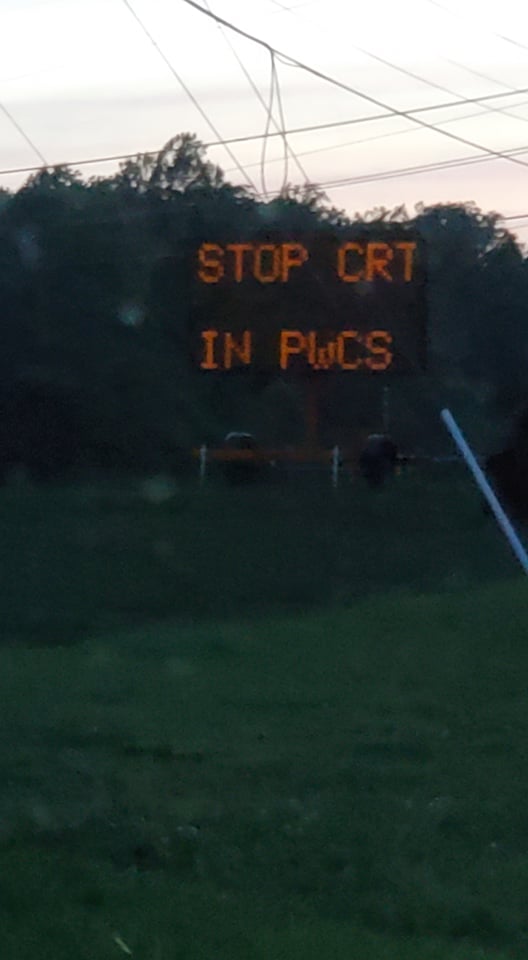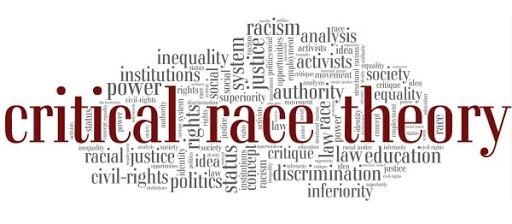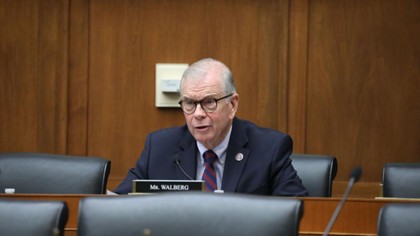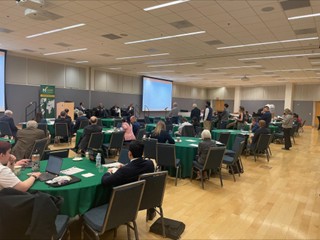The Truth of Critical Race Theory and How We Got Here
Educator and Columnist Kristina Nohe discusses misconceptions about CRT and how it can be implemented
If you’ve driven anywhere on Route 234 in Dumfries over the past few weeks, no doubt that you’ve seen this sign on the way to Manassas…

This is an attempt to curb the momentum of teaching true American history in what is coined as Critical Race Theory (CRT) in Prince William County. What was once simply discussed in educational circles has now turned into a political ideology by individuals refusing to acknowledge the country’s divisive systems of the past. Which is ironic in its nature considering those same forces have rallied around keeping the memories of Confederate statues and monuments alive as much as possible.
Recently, we spoke with Kristina Nohe, educator, community activist, and Senior Contributor for Bearing Drift, a conservative website. Nohe addressed misconceptions behind CRT as well as some of the reasons behind keeping CRT out of schools in her recent article.
She discussed the true definition of CRT. “Critical Race Theory is something that is used at the graduate level. It’s used in law schools, anthropology, sociology, and humanities to look at the role that race has played. Not in the way race is discussed between individuals, but how race is discussed in the system. For example, in my class we were discussing the electoral college. It is a relic of the slave system, as it came out of the great compromise between slave holding and non-slave holding states. The slave holding states had larger amounts of land but not as many people so they were counting the enslaved people as 3/5ths of a person towards their representation in Congress. It is still something we’re dealing with today. The way they set up the system was to reward large land owners by counting people who cannot vote.
“Looking at it through the lens of critical race theory allows us to connect those dots, from the 1780’s all the way to 2021. What I discovered through my research on it is the critical part, not necessarily the racial part. It’s using critical thinking to look at things outside of your own experience. It’s like the story of the blind monks who are looking at the elephant and touching different parts of it, only describing what they can feel. CRT helps us to look at the whole elephant. That is not something that we’re teaching in public schools but at the collegiate and graduate level because we’re discussing theory.”
Although this may seem like a newfound theory, its roots go all the way back to former President Ronald Reagan’s advisor Lee Atwater, who created the infamous ‘Southern Strategy,” which used dog whistle terminology to label Blacks and other minorities. Here is an insert from the interview (WARNING: Contains Racist Language)
Nohe goes on to address how this was implemented back in 1954. “As someone who was Republican I was thinking, ‘maybe there was some context to it.’ The context makes this even worse. He (Atwater) said that you could be blatantly racist to get votes, but when that didn’t fly, they came up with another way to describe the economic situation for Black people. Even Newt Gingrich describes this in [the Netflix documentary] 13th when he says ‘We’re going to take the word race out’. There’s nothing that makes white Americans more uncomfortable than discussing race.”
“Most of us were raised with the notion that we don’t see color, and anything that describes it makes people uncomfortable. So you had to build this different vocabulary to describe race without mentioning it specifically. You can follow that thinking throughout history, whether it’s in Brown v. Board of Education, welfare mothers, crack babies, and what have you. Now we see it in Birtherism and Black Lives Matter by saying “All Lives Matter.” CRT is the latest iteration of what’s going on. You can go back to Antebellum during the Civil War when the South was describing slavery as a benevolent paternalistic system where they’re portraying enslaved Black people as not smart enough and not worldly enough to take care of themselves. It’s a stereotype that’s been used to separate. Racism is the tool, but fear is the goal. We react much more viscerally to things that we fear, so keeping those fears alive that literally go back centuries since the movie ‘Birth of a Nation.’ Seeing it cast into the mindsets of the American psyche, where people are afraid of changing the narrative.”
“The thing that is most glaring to me is this acknowledgement in the fear of addressing inequities in the system, because white parents are reacting they don’t want their children to be treated the way children of color have been treated since 1619, to have things taken away from them. It’s an acknowledgement that we know something is going on, but we don’t want it to happen to us. There’s a coddling by politicians in exchange for votes. We’ve seen it especially in the Virginia Governor’s race with Republican candidate Glenn Youngkin.”
Speaking of which, how did it get to the point where it is now a talking point on the news? “It has become this perfect little pocket of politics that you can put into; it’s a complex idea so it takes nuance to explain it, but no nuance to exploit it. All they have to say is CRT, and people have this whole idea that there’s going to be brainwashing of white children. It harkens back to the doll studies that took place during Brown v. Board of Education. Parents are fearful that this will happen to their children. The problem is saying that we should not evolve.”
“Because we can’t prove a negative, it’s piggybacking off of the BLM movement where it’s saying that they’re coming after your children. Parents care about transportation, infrastructure and their children. If you are going after their children, then they’re going to respond. That emotional investment of protecting the children becomes the focus, and someone is asked to prove a negative. They’re seeing the browning of American and as a result they create conspiracy theories.”
So for parents who may be opposed to CRT, what is the best way to speak to them? Nohe reflects on her own history. “As a mother of two Black children, I did not know what I did not know. So, I can understand where peole are coming from, because ten years ago, I was suffering from the standard American narrative that is taught to students. There’s this idea of, ‘I believe what I was taught, and I don’t want that challenged.’ For a lot of white people, there’s a lot of self-reflection that has to go on, and that’s a difficult thing to process, as well as beliefs you have held. The folks that are stil at the beginningof the journey, I have empathey for them. When I began looking at this from a historical point of view, I wasn’t doing this in a maelstrom of self-created political perpetuation of falsehoods by Fox News every night. I had room and space to read and was blessed to be surrounded by people who walked with me on this journey by showing me things to read. Once that floodgates open, you can’t forget or unsee what you have seen.”
“My hope is that they would look at this more from an intellectual standpoint than an emotional one. Is it time for it to be taught in our public schools? Absolutely! This idea of waiting is a narrative that people of color have been chanting at the powers that be for centuries. The question is how do we break through the static of people who are using this for self-aggrandizement and those who are using it for political gain? It can be in the conversations we can have on a one-on-one level. It is imperative that we go in these conversations with patience.”
“Taking that bead of grace and saying, ‘let me help you,’ as opposed to just screaming at one another, that should be something that is the modus operandi; taking their hand and saying there is another way. Use the Socratic method of asking questions to challenge why someone thinks a certain way, asking why someone believes the way they do.”
“The idea that is baked into our schools is American exceptionalism, and anything that challenges that is pushed back against. There’s been this steady progression that says we’ve never backslid, but there’s a lot going on that needs to be addressed. It’s not something that should just be taught to Black children.”
What were her thoughts when she saw the aforementioned sign on 234? “I live near there so I see it all the time. If it can fit on a traffic sign, then that’s not the whole story. I think that the term Critical Race Theory such toxicity added to it that it’s become a wall between people to stoke the fires of fear. The thing I struggle with is that when people say, “I want to hear about real history taught.” Do you really?”
“The term is not sacrosanct; we want representation in history. Especially in a majority-minority county like Prince William County, we should strive to do that.”
“Part of the other issue not being discussed is our reliance on standardized testing is handcuffing our teachers. Those tests skew white, they skew Christian, they skew middle class. In order for schools to get funding, they have to pass these tests. Instead of trusting teachers to come up with the curriculum, they have to teach what they know. So it doesn’t allow teachers to teach students in the way that is the most effective; you want to teach students in a manner that challenges why they think, just not what to think. The obsession with standardized testing has made it that more difficult to break out of the patterns we already set. Diversify our education by removing the handcuffs from teachers’ hands.”
So where do we go from here? “We cannot give up on the term ‘equity.’ I don’t understand people who are against equity; it gives every child the tools to succeed. Keep telling them CRT is not being taught in public schools, diversity the education, and remove this reliance on standardized testing.”



